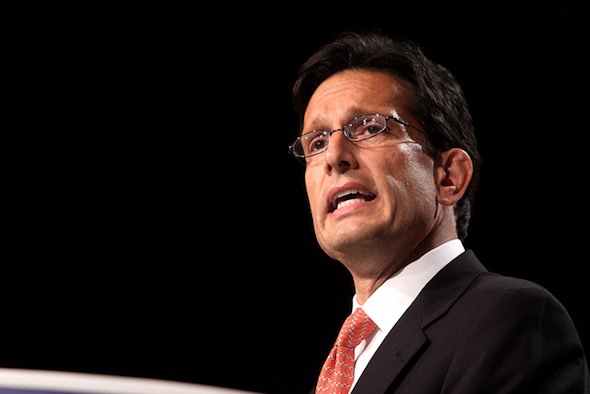Eric Cantor and ‘The Certainty of Conservative Sellout’
Salon columnist Thomas Frank explains House Majority Leader Eric Cantor's surprising loss to a tea party primary challenger last week as "part of a long-running and basically unchanging Republican melodrama. …An eternal populist revolt against leaders who never produce and problems that never get solved."
Salon columnist Thomas Frank explains House Majority Leader Eric Cantor’s surprising loss to a tea party primary challenger last week as “part of a long-running and basically unchanging Republican melodrama. …An eternal populist revolt against leaders who never produce and problems that never get solved.”
To put the trend in focus, Frank cites “Young Guns,” a book Cantor published in 2010 to explain the “drubbing [Cantor’s] party took in the 2006 Congressional elections.” Further back, in 1994, his party seized Congress by appealing to voters’ idealism. Once in power, however, it “left these principles behind,” Cantor wrote. His predecessors “became what they had campaigned against: arrogant and out of touch. There were important exceptions, but the GOP legislative agenda became primarily about Republican members themselves, not the greater cause,” the congressman noted.
“We got what we had coming,” Cantor lamented.
In view of the rejection by voters, Frank writes, “these passages seem highly ironic and more than a little bit prophetic.”
“The clash of idealism and sellout are how conservatives always perceive their movement,” he explains, “and what happened to Eric Cantor is a slightly more spectacular version of what often happens to GOP brass. That right-wing leaders are seduced by Washington, D.C., and that they will inevitably betray the market-minded rank-and-file, are fixed ideas in the Republican mind, certainties as definite as are its convictions that tax cuts will cure any economic problem and that liberals are soft on whoever the national enemy happens to be.
“And so the movement advances along its rightward course not directly but by a looping cycle of sincerity and sellout in which the radicals of yesterday always turn out to be the turncoats of today; off to the guillotine they are sent as some new and always more righteous generation rises up in their place.”
The victor in Cantor’s race, a college economics professor named David Brat, “simply called [Cantor] on this blatant reversal,” railing against “crony capitalism” and its “flesh-and-blood representative,” Frank writes. Quoting Brat: “All the investment banks up in New York and D.C., those guys should’ve gone to jail. …Instead of going to jail, where’d they go? They went onto Eric’s Rolodex.”
Frank asks: “Why is it that Republicans are uniquely prone to this cycle of idealism and betrayal?” His answer is elegant and incisive. “Because free-market idealism is a philosophy that automatically leads to betrayal—and also to misgovernment, and cronyism, and even corruption, as we saw in the DeLay era. The movement’s greatest idealists often turn out to be its greatest scoundrels—think of Jack Abramoff, or of Oliver North, or (as Rick Perlstein has pointed out) the gang of hard-right purists who signed up to do dirty tricks for Richard Nixon. In truth, there seems to be no real contradiction between conservative morality and following the money; to be a capitalist true-believer is to sell yourself.”
Among the finishing strokes in his essay: “To be true to [the principle of free-market idealism] means respective incentives, answering the call of money.” And quoting from his 2009 book, “The Wrecking Crew,” politicians like Cantor “did not do these awful things because they were bad conservatives; they did them because they were good conservatives, because these unsavory deeds followed naturally from the core doctrines of the conservative tradition.”
— Posted by Alexander Reed Kelly.
Your support matters…Independent journalism is under threat and overshadowed by heavily funded mainstream media.
You can help level the playing field. Become a member.
Your tax-deductible contribution keeps us digging beneath the headlines to give you thought-provoking, investigative reporting and analysis that unearths what's really happening- without compromise.
Give today to support our courageous, independent journalists.






You need to be a supporter to comment.
There are currently no responses to this article.
Be the first to respond.